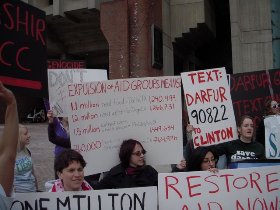Activists rally in US cities against aid expulsion
March 24, 2009 (WASHINGTON) – A new round of protests was undertaken against the United States government for failing in its appeal on behalf of 16 aid groups ousted from Darfur by the Government of Sudan.
 Protesters appeared at the Federal Buildings in San Francisco and Los Angeles, and at Boston’s City Hall Plaza. Activists used their cell phones to send text messages to a State Department number for Secretary of State Hillary Clinton, as did a number of church congregations that took part Sunday.
Protesters appeared at the Federal Buildings in San Francisco and Los Angeles, and at Boston’s City Hall Plaza. Activists used their cell phones to send text messages to a State Department number for Secretary of State Hillary Clinton, as did a number of church congregations that took part Sunday.
The first event started March 23 in Los Angeles, said Susan Morgan, a spokeswoman and member of both the San Francisco Bay Area Darfur Coalition and Massachusetts Coalition to Save Darfur.
“There’s a really incredible network of grassroots activists,” said Morgan, who estimated that 200 to 300 people participated in the Boston protest, as well as 50 in New York and smaller groups in Los Angeles, Las Vegas and San Francisco.
The activists presented a united appeal on behalf of the 16 expelled aid groups, said Morgan, referring to humanitarian agencies accused by the Sudan government of collaborating with the International Criminal Court.
The United Nations humanitarian coordinator for Sudan, Ameerah Haq, said in Khartoum today that up to 650,000 people in Darfur currently do not have access to full health care, nutritional surveillance and supplementary feeding programmes for malnourished children and for pregnant and nursing women have been interrupted and access to those in need is hampered by administrative hurdles such as the lack of travel permits and technical agreements.
“To call the situation in Darfur a grave emergency is an understatement,” said Mohamed Suleiman, a Darfuri and a member of the Executive Committee of the San Francisco Bay Area Darfur Coalition.
He added that two camps in the Zalingei area, Hassa Hissa and Khamsa Dagaig, have cut food rations to 60%. The camps, which are being managed by local sheiks in the absence of aid organizations, are also running out of chlorine for purifying water, he said. Oil generators for water pumps, which used to run ten hours per day, now are running only six hours per day.
Medical clinics for the camp residents now provide treatment only three days a week, as opposed to five days a week prior to the expulsion order, and medical supplies are dwindling, said Suleiman. He cautioned that it would be too dangerous for camp residents to venture into the city of Zalingei for treatment at the hospital, since in the past there has been a lot of harassment from Janjaweed in the area.
“Grassroots activists have worked closely with both Save Darfur Coalition and ENOUGH on this and they have helped move things forward,” stated Morgan, referring to Washington-based lobbyist groups. “However, we want the Administration to understand that this concern is fueled by the concern of ordinary Americans in many parts of the country.”
In Los Angeles, activists representing Stop Genocide Now pitched a tent in front of the Federal Building in order to draw attention to their position on Darfur. Three leaders of the group subsequently departed for Chad, according to their website.
“Activists want Secretary Clinton to make the Darfur emergency and peace in Sudan a top priority immediately,” explained Morgan.
During the 2008 presidential campaign, Barack Obama said that he intended to implement a no-fly zone over Darfur. State Department officials have declined to comment on the campaign promise, which is endorsed by Darfur rebel groups.
(ST)
